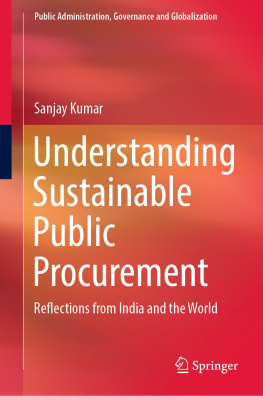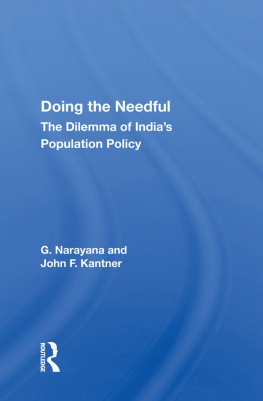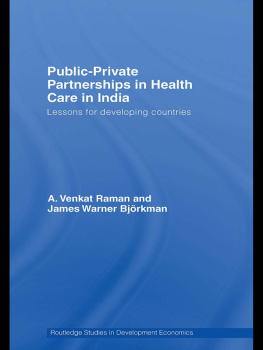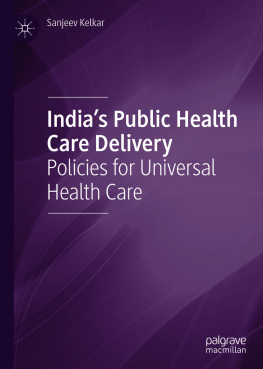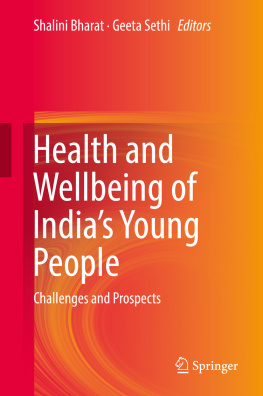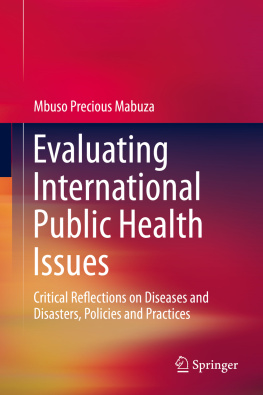
This is an authoritative and much-needed study of Indias family planning programme [It] provides us both with important insights regarding past performance and crucial recommendations as to how future family planning activities in the country should proceed.
Tim Dyson , Professor of Population Studies,
London School of Economics
The book provides an authentic account and insight into Indias family planning programme from inception till today and what lies ahead in terms of demographic challenges and opportunities. The authors systematically try to build an understanding on the dynamics of population growth, the demographic dividend, family planning and its impact on maternal and child health as well as on women.
M. S. Swaminathan , UNESCO Chair in Ecotechnology and Founder
Chairman and Chief Mentor, M. S. Swaminathan
Research Foundation, Chennai
Indias Family Planning Programme
This book closely examines the changes, challenges and shifts in Indias family planning programme since its inception in 1952. It discusses the dynamics of population growth, the demographic dividend, family planning and its impact on maternal and child health and the pressures from various quarters to remove method-specific contraceptive targets from the programme. The volume highlights the shortcomings in the delivery of services by the public sector and the critical role of non-government orga nisations in research, promotion and advocacy.
Rich in empirical data, this book will be an indispensable resource for scholars, policymakers, organisations and NGOs concerned with population and demographic studies. It will also interest those in sociology, public policy and public health.
Leela Visaria is Honorary Professor and former Director, Gujarat Institute of Development Research, Ahmedabad, India. She has a Ph.D. in Sociology from Princeton University. Her research is in historical demography, health, family planning, education and demographic transition. She has authored several peer-reviewed articles and has co-authored and/or edited six books including Twenty-first Century India: Population, Economy, Human Devel opment and the Environment (2004) and Abortion in India: Ground Realities (2007). She was the first President-elect of the Asian Population Association (200910).
Rajani R. Ved is currently Advisor, National Health Systems Resource Center, New Delhi, India. She has a medical degree from Madras Medical College and a masters degree in Public Health from Harvard University. Her work focuses on primary health care and women and childrens health. Her research experience and writing deal with implementation issues within health systems.
First published 2016
by Routledge
2 Park Square, Milton Park, Abingdon, Oxon OX14 4RN
and by Routledge
711 Third Avenue, New York, NY 10017
Routledge is an imprint of the Taylor & Francis Group, an informa business
2016 Population Foundation of India, New Delhi
The right of Leela Visaria and Rajani R. Ved to be identified as authors of this work has been asserted by them in accordance with sections 77 and 78 of the Copyright, Designs and Patents Act 1988.
All rights reserved. No part of this book may be reprinted or reproduced or utilised in any form or by any electronic, mechanical,
or other means, now known or hereafter invented, including photocopying and recording, or in any information storage or retrieval system, without permission in writing from the publishers.
Trademark notice: Product or corporate names may be trademarks or registered trademarks, and are used only for identification and explanation without intent to infringe.
British Library Cataloguing in Publication Data
A catalogue record for this book is available from the British Library
Library of Congress Cataloging-in-Publication Data
A catalog record has been requested for this book
ISBN: 978-1-138-11898-0 (hbk)
ISBN: 978-1-315-65249-8 (ebk)
Typeset in Galliard
by Apex CoVantage, LLC
In the memory of the late JRD Tata
Contents
by Poonam Muttreja
This book is a contribution by the Population Foundation of India (PFI) towards building a comprehensive and updated understanding of the dynamics of Indias population growth, of its demographic advantages and the impact of family planning on maternal and child health and of the position of women in society. The chapters in the book offer historical perspectives and insights into Indias family planning movement and help us understand the importance of repositioning family planning policies, as well as maternal and child health programmes, within a framework of womens empowerment and human rights.
The need for repositioning is even more relevant today in the light of the Union Governments assurance that it plans to pursue population stabilization in a mission mode and as integral to a soon-to-be-announced, revised and comprehensive health policy. We hope that this book will serve as a useful reference guide not only for scholars, policy makers and programme managers but also for those interested in the evolution of the programme, its complexities and challenges.
Since the launch of the National Family Planning Program in 1952, sustained efforts by India to achieve population stabilization have yielded positive results. According to the recent data for 2013, India has attained a total fertility rate (TFR) of 2.3, the urban fertility rate has fallen to 1.8, below the replacement level of fertility and 14 out of 35 states have already achieved a TFR of 2.1. Today, awareness about the benefits of small families is almost universal, and even the poorest and most marginalized women do not want more than two children.
Indias thinking on population over the past two decades has been shaped by the International Conference on Population and Development (ICPD) held in Cairo in 1994 which argued for a paradigm shift from the earlier emphasis on population control to sustainable development. Asserting that people mattered more than numbers, the Conference called upon the countries to agree that population is not just about counting people, but about making sure that every person counts. ICPD linked population issues with sustainable development, reproductive health and reproductive rights.
This shift in thinking in Indias policies, approaches and strategies is reflected most clearly in the countrys first National Population Policy (NPP) announced in 2000. The NPP adopts the basic philosophy from the ICPD-Program of Action and outlines a comprehensive approach to population stabilization. It calls for addressing the social determinants of health, promoting womens empowerment and education, adopting a target-free approach, encouraging community participation and ensuring convergence of service delivery at the community level. Promoting a basket of contraceptive choices and addressing socio-cultural factors such as age at marriage, age at first birth and education of girls for maternal and infant well-being find prominent place in the policy. Indias commitments to further improve access to family planning services and reduce the unmet need for contraception made at the London Summit on Family Planning in 2012 have brought back family planning to the centre stage of development.
Recent measures by the Ministry of Health and Family Welfare (MOHFW) further reiterate its commitment to family planning. For example, following the fateful sterilization deaths in Bilaspur in 2014 and PFIs spirited engagement with the Ministry, the Union government has urged the state governments to adopt measures for improving the quality of care and building the capacity of service providers. State governments have been asked to ensure that quality family planning services are provided in a spirit of voluntarism and within a rights and accountability framework. The Ministry has also asked the states to re-orient all programme officers and service providers on the standard operating procedures for sterilization. Constructive engagement by PFI also resulted in the Economic Survey 201415 presented by the finance minister acknowledging, for the first time, the need for repositioning family planning priorities and revisiting incentives for family planning services, particularly sterilization. The MOHFWs recent announcement to enlarge the scope of contraceptive choices to rejuvenate the family planning programme is a welcome step forward.


